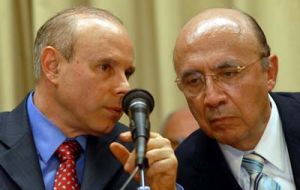MercoPress. South Atlantic News Agency
Brazil approaching the moment interest rates can only be increased
 Top players Guido Mantega and Henrique Meirelles
Top players Guido Mantega and Henrique Meirelles Brazilian annual inflation rose above government target (4.5%) levels for a second consecutive month in February reaching 4.83%, up from 4.59% in January, Brazilian Census and Geography Bureau, or IBGE, said Friday.
Eulina dos Santos, coordinator for IPCA data at IBGE, said 2010 has already accumulated inflation of 1.54%, well above the 1.03% in the first two months of 2009.
“Discounting inflationary pressures normal for this time of year, such as in education and food, what has caused this level of much higher inflation is the recovery of the economy itself,” said Dos Santos. However she admitted that inflation in education costs in January and February may have skewed the data for those months.
If inflation were calculated without education costs, then it would have eased 0.35 percentage points in the first two months of the year, compared to the year-ago period. “This proves that the trend for inflation in other costs is to fall,” she said.
But analyst believe that the dynamism of economic activity is likely to keep core inflation running slightly above the targeted level and raise the chances of an interest rate hike this month when the Central Bank monetary committee, Copom, meets.
Brazil’s debt market is betting 50%-60% on a rate hike in March, said Octavio Vaz, a trader at Rio de Janeiro’s Global Equity, although his firm is predicting no change in March rates. The benchmark Selic rate is currently at a record-low 8.75%.
Although IPCA inflation will be considered by Copom later this month, other factors must also be brought into the equation.
Industrial capacity usage figures released Thursday showed a slight decline in January to 81.4% from 81.5% in December. Industrial output figures for February, while strong, suggested the pace of expansion was decelerating or settling.
Finance Minister Guido Mantega said Monday he believed the central bank’s decision to raise bank reserve requirements would help control inflation by curbing the local credit supply. “I’m hoping it won’t take any other measures,” he said.
Speaking in New York Friday, Brazilian Central Bank President Henrique Meirelles acknowledged that raising reserve requirements affects monetary policy, but said it isn’t a substitute for interest rates.
“Interest rates are the most important and effective measure for monetary policy,” he added, declining to say on whether rates will be raised at the next policy meeting




Top Comments
Disclaimer & comment rulesCommenting for this story is now closed.
If you have a Facebook account, become a fan and comment on our Facebook Page!